9 Fruits That Can Help You Hit Your Protein Goals

MixMedia / Getty Images
Medically reviewed by Allison Herries, RDN
Protein is a macronutrient your body needs to build muscle, fight infections, produce hormones, and perform many more critical processes. Protein needs vary depending on factors like age, weight, and activity levels, but most active people probably need between 0.54-0.9 grams of protein per pound (1.2-2 grams per kilogram) per day to maintain muscle mass and support optimal health.
Certain foods, such as beans, chicken, eggs, and Greek yogurt, are packed with protein, while others, like fruits, are low in this essential nutrient. The protein content of fruit rarely climbs above 1% of total weight, but some fruits are higher in protein than others.
1. Guava
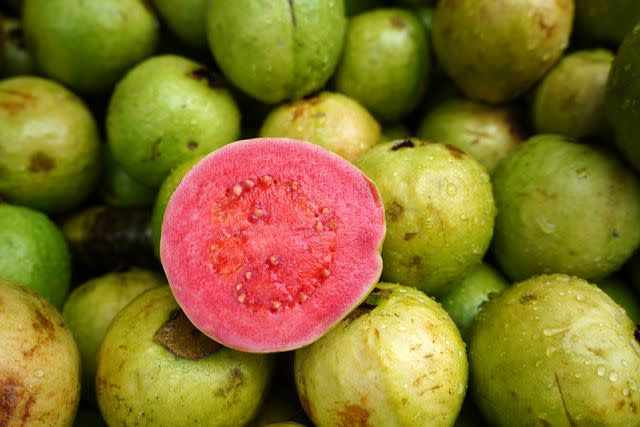
Wokephoto17 / Getty Images
Guava is a sweet and tangy-tasting tropical fruit packed with nutrients like vitamin C and fiber. It has one of the highest protein contents of all fruits, providing 4.21 grams (g) of protein per cup.
The same serving packs 376 milligrams (mg) of vitamin C, which covers over 400% of your daily needs for this nutrient. Vitamin C is required for immune function and collagen synthesis and acts as a powerful antioxidant in the body, protecting against cellular damage that may otherwise lead to disease.
Try slicing fresh guava on yogurt or pairing guava with nuts for a protein-packed snack.
2. Avocado
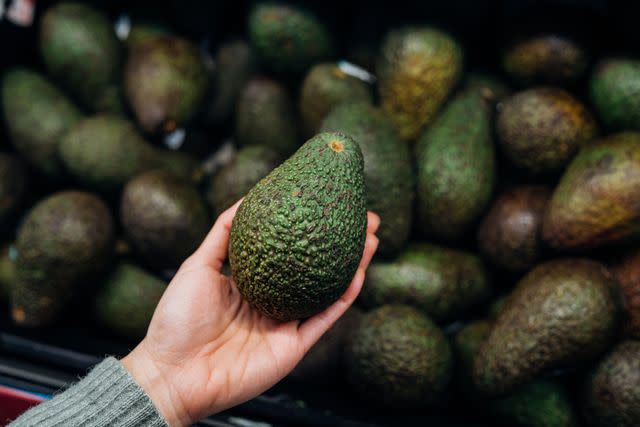
Oscar Wong / Getty Images
Unlike most fruits, avocados aren't sweet and are usually enjoyed in savory recipes. Another quality that sets avocados apart from other fruits is their higher protein content. One 201-gram avocado contains 4.01 grams of protein, making it one of the highest-protein fruits you can eat.
Avocados are also rich in fiber, vitamin E, vitamin C, magnesium, and folate, making them an all-around nutritious choice.
Top salads, soups, and grain dishes with sliced or diced avocado for a boost of fiber and protein, or add mashed avocado to high-protein sandwiches for a nutritious alternative to traditional spreads like mayo and mustard.
3. Jackfruit
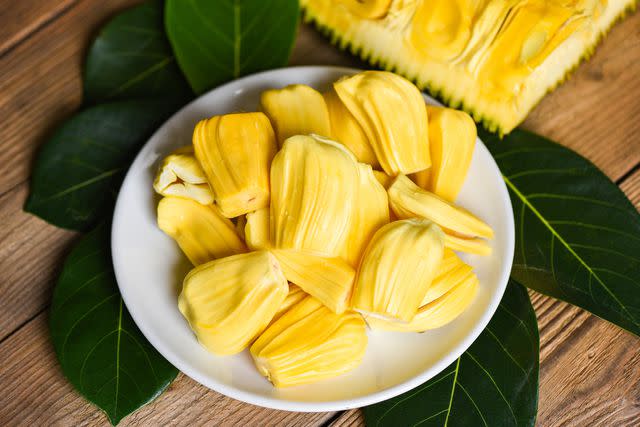
oldovosmin17 / Getty Images
Jackfruit are the largest edible fruits in the world, with some growing up to 110 pounds in weight.
These unique fruits are high in several nutrients, such as B vitamins, vitamin C, magnesium, and potassium, and are rich in protective plant compounds like carotenoid antioxidants. They're also relatively high in protein for fruits, providing 2.84 grams of protein per cup.
Raw jackfruit has a sweet, pineapple-like flavor, while unripe jackfruit has a more mild taste. Ripe jackfruit can be combined with protein powder to make a protein-rich smoothie, while unripe jackfruit can be used as a plant-based meat alternative in dishes like tacos, soups, and curries.
4. Passion Fruit
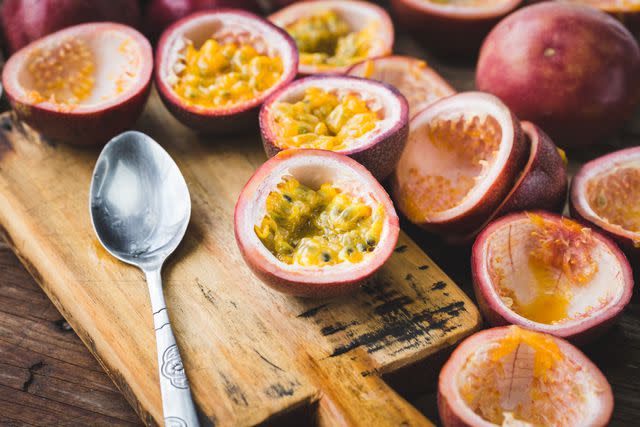
Thai Thu / Getty Images
Passion fruits are tropical fruits that have an intense, sweet and tart flavor. Passion fruit can be enjoyed raw and is commonly used to make drinks, like juices and smoothies.
Passion fruit is an excellent source of antioxidants, including vitamin C, carotenoids, and polyphenol compounds, which can benefit overall health by protecting against cellular damage and reducing inflammation.
A 100-gram serving of fresh passion fruit contains 2.2 grams of protein, making it a good choice for those wanting to add protein-rich fruits to their diets.
Passion fruit is acidic, so it's best mixed with other ingredients to mellow its intense taste. Try adding passion fruit to protein shakes or smoothies and raw passion fruit to a snaking plate with high-protein ingredients like cheeses and nuts.
5. Blackberries
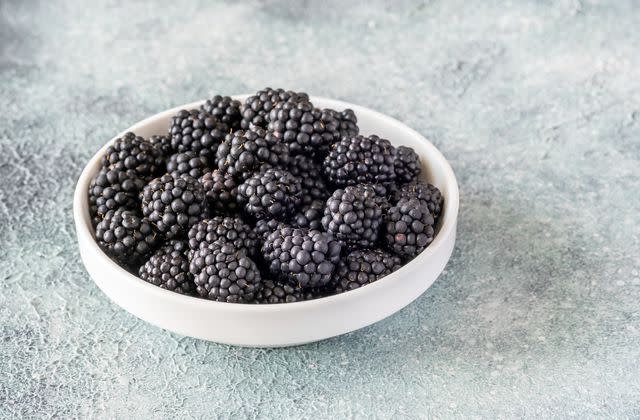
Zana Munteanu / Getty Images
A one-cup serving of raw blackberries provides two grams of protein, which is higher than what you'll find in most fruits. Blackberries are also rich in other nutrients, such as fiber, vitamin C, vitamin K, and manganese.
Just one cup of blackberries contains 7.63 grams of fiber, which covers 28.5% of the Daily Value (DV). High-fiber foods benefit many aspects of health, including digestive health. Adding more fiber to your diet can support the growth of beneficial bacteria in your large intestines, strengthen the gut barrier, and keep bowel movements regular and comfortable.
Eating more fiber can also help reduce your risk of health conditions like heart disease, colon cancer, and diverticulitis (a digestive condition that occurs when small pouches along the walls of your intestine become infected or inflamed).
Blackberries can be enjoyed as a snack or added to high-protein dishes like yogurt parfaits.
6. Apricots
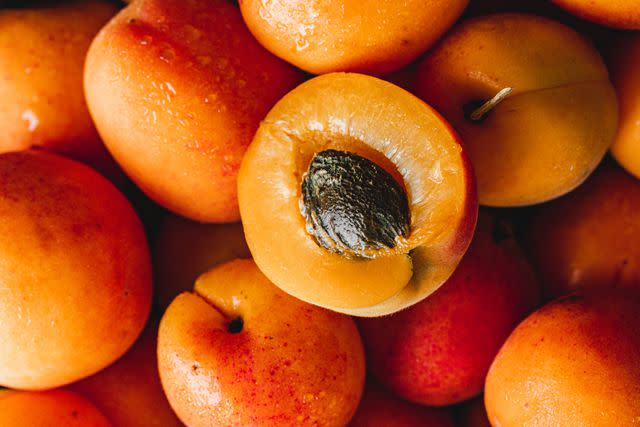
alvarez / Getty Images
Apricots are a type of stone fruit, which are fruits that contain a pit or stone in their center. The bright orange flesh of apricots has a sweet taste and is concentrated in antioxidants, vitamins, and minerals. For example, apricots are packed with beta-carotene, a carotenoid pigment that has powerful cellular-protective properties. Research shows that having high blood levels of carotenoids may help reduce the risk of developing several diseases, including breast cancer.
Apricots contain 2.31 grams of protein per cup, making them a high-protein fruit option. Apricots can be enjoyed fresh and are also delicious dried.
Dried apricots are much higher in protein than fresh apricots, providing 4.41 grams of protein per cup. Dried apricots have a chewy texture and sweet taste and are a popular ingredient in high-protein snack mixes, like trail mix. Like all dried fruit, they are higher in calories than fresh apricots and are sometimes sweetened with added sugar, which should be limited to promote optimal health.
7. Pomegranate
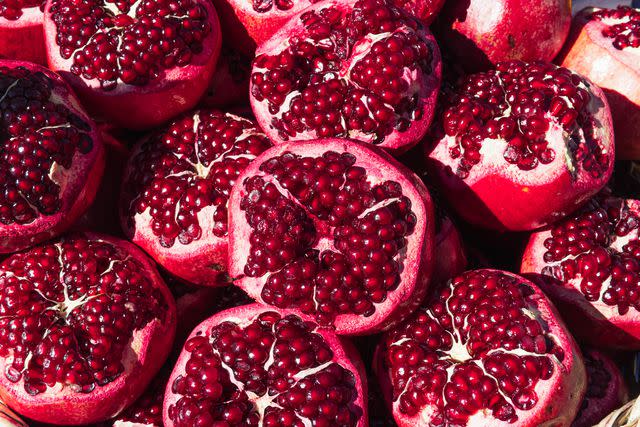
Denys Popov / Getty Images
Pomegranate seeds, or arils, are surprisingly high in protein, providing 2.9 grams per cup. In addition to protein, pomegranate arils are exceptionally high in fiber, which is important for the health of the digestive system and heart, and antioxidant and anti-inflammatory compounds such as anthocyanins and organic acids.
Studies show that eating pomegranate arils and drinking pomegranate juice could benefit several aspects of health, such as improving cognitive function, reducing heart disease risk factors, and supporting post-exercise recovery.
Pomegranate arils are versatile and can be used as a nutrient-dense topping for salads, yogurt parfaits, grain bowls, and more. They can also be enjoyed on their own as a sweet and crunchy snack and paired with high-protein foods like cottage cheese.
8. Kiwi
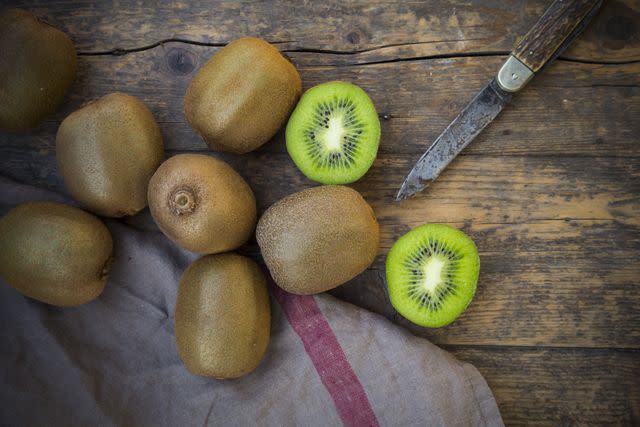
Westend61 / Getty Images
Kiwifruit, commonly known as kiwis, are small, oval-shaped fruits that have an impressive nutrition profile. Kiwis are high in a number of vitamins and minerals, including folate and vitamins C, E, and K. They're also higher in protein than many other fruits, containing just under two grams of protein per cup.
In addition to protein, vitamins, and minerals, kiwis provide a good source of fiber and can be a helpful snacking choice for those with constipation as they've been shown to be effective for softening stool and supporting regular bowel movements.
Kiwis are delicious on high-protein dishes like overnight oats and yogurt bowls. They can also be enjoyed as a snack alongside high-protein foods like cheeses, nuts, and seeds.
9. Cherries
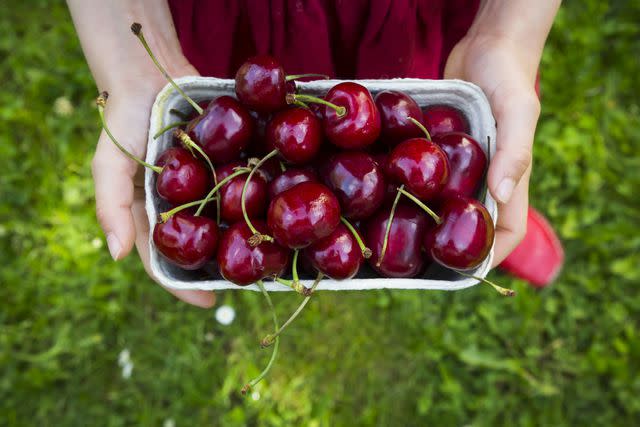
Westend61 / Getty Images
Cherries are amongst the healthiest and tastiest fruits you can eat. Adding more cherries to your diet could benefit your overall health in several ways, including reducing heart disease risk factors like high blood pressure and cholesterol levels, decreasing markers of oxidative stress, and improving blood sugar regulation.
Cherries are an excellent source of antioxidants like anthocyanins and also provide vitamins and minerals, such as vitamin C and potassium. Though not as high in protein as other fruits on this list, a one-cup serving of sweet cherries packs a respectable 1.63 grams.
Cherries pair well with many ingredients and can be added to both sweet and savory recipes, like chia pudding and salads. For a nutritious high-protein dessert option, try making a high-protein Greek yogurt parfait by layering unsweetened Greek yogurt with sliced cherries, chia seeds, and almonds.
Tips for Consuming More Fruit and Protein
Though fruits aren't the most protein-rich foods, they can add a sweet and satisfying flavor to high-protein recipes and be paired with protein-rich foods for a filling snack.
Here are some ways to incorporate fruits into high-protein meals and snacks:
Make a high-protein snack plate by combining dried apricots, blackberries, and fresh cherries with cheddar cheese and mixed nuts
Top a green salad with roasted chicken, chickpeas, sunflower seeds, goat cheese, and pomegranate arils for a sweet and savory flavor
Add frozen blackberries and cherries to a smoothie made with unsweetened vanilla protein powder
Mix guava and sliced kiwi into Greek yogurt
Try out canned, unripe jackfruit in high-protein plant-based dishes like curries
Make a high-protein, antioxidant-rich yogurt bark by spreading Greek yogurt mixed with a sweetener of your choice on a sheet tray, topping it with pomegranate arils and dark chocolate chips, and freezing the mixture until firm
Fresh fruits are sweet, portable, and versatile, making fruit an excellent choice for boosting your protein intake.
Dried fruit, like dried apricots, is also a healthy choice that's shelf-stable. Choose unsweetened dried fruit products whenever possible.
A Quick Review
Though most fruits are low in protein, a few types are higher in this nutrient than others. Guava, avocado, jackfruit, passionfruit, blackberries, apricots, pomegranate arils, kiwis, and cherries are among the highest protein fruits you can eat and may help you reach your daily protein needs.
Try combining these fruits with high-protein foods like Greek yogurt, cheese, and nuts, for a delicious way to boost your protein intake.
For more Health.com news, make sure to sign up for our newsletter!
Read the original article on Health.com.

